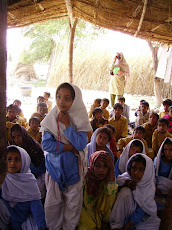Statement by the UN Special Rapporteur on Contemporary forms of Slavery, Gulnara Shahinian, to mark the International Day for the Abolition of Slavery
GENEVA (2 December 2010) – “Domestic workers who are subject to abuse — whether physical, emotional or sexual in nature — are effectively being treated as slaves,” warned the UN Special Rapporteur on Contemporary forms of Slavery, Gulnara Shahinian, on the International Day for the Abolition of Slavery.
“This form of slavery takes place in households all across the world, and although the victims remain largely invisible to the larger public, domestic servitude constitutes a global human rights concern,* Ms. Shahinian said, stressing that every region in the world is affected.
“I have seen women who lived as enslaved servants since they were born. I have talked to children who were given away to ‘foster families’ who then ruthlessly exploited them as domestic slaves, instead of caring and educating them. I have met with migrant domestic workers, whose dream of earning money abroad to feed their families turned into a nightmare of exploitation and humiliation,” the Special Rapporteur said.
Paid domestic work, where the workers’ human rights are respected and protected, provides a valuable contribution to society. Domestic workers often provide families with the opportunity for the parents to balance their professional and personal responsibilities. However, the human rights independent expert highlighted that millions of vulnerable people face a different reality.
In her latest report*, Ms. Shahinian outlined the many different forms and shapes of domestic servitude and noted that the majority of victims are girls and women. “Domestic servitude or slavery is a situation when a vulnerable individual is forced, by physical and/or moral coercion, to work without any real financial reward, is deprived of his or her liberty, and is in a situation which is contrary to human dignity.”
Children are particularly vulnerable to domestic servitude, especially if they live with their employers and/or migrate on their own to find domestic work. In many cases, they work in hazardous circumstances that amount to the worst forms of child labour outlawed by international conventions.
“No child under 18 years should have to live with their domestic employer or work abroad as a domestic worker,” the Special Rapporteur said. “It should also be prohibited to employ children who are younger than 15 or still completing their mandatory education if this interferes with their schooling.”
In recent years, the migration of women for domestic work has rapidly grown and become one of the key factors in the ongoing feminization of migration. An entire industry of migrant domestic work has evolved, driven by a surging demand for domestic work in richer countries, stark global income inequalities and transnational recruitment agencies. “Migrant domestic workers are vulnerable to subjugation to servitude, because they often have a precarious migration status and face numerous prejudices,” she said.
“States should focus on reducing the invisibility of the domestic worker by including provisions that strongly regulate the use of child domestic workers, provide domestic workers with the options as to whether or not they should live with their employer and regulate all aspects of recruitment, placement and work, including for migrant domestic work.” Ms. Shahinian stressed.
“Victims of servitude should be treated as victims of a crime and not be considered as having violated immigration and/or labour laws. These victims should also have access to and receive all necessary protection and assistance,” the Special Rapporteur said. “All perpetrators of the crime of domestic servitude must be prosecuted. Diplomats found to be perpetrators of such a crime should have their immunities lifted and be prosecuted.”
On the International Day for the Abolition of Slavery, Ms. Shahinian also urged States to engage in the development of the International Labour Organization Convention on Decent Work for Domestic Workers and make sure that the Convention will be based on the major human rights treaties.
In May 2008, the Human Rights Council appointed Ms. Gulnara Shahinian as the first Special Rapporteur on Contemporary forms of slavery, its causes and consequences. Ms. Shahinian is a lawyer and has extensive experience working as an expert consultant for various UN, EU, Council of Europe, OSCE and government bodies on children's rights, gender, migration and trafficking. She is also a former trustee of the UN Voluntary Trust Fund on Contemporary Forms of Slavery.
(*): Check the latest report by the Special Rapporteur: http://www2.ohchr.org/english/issues/slavery/rapporteur/docs/A.HRC.15.20_EN.pdf
Lear more about the mandate of the Special Rapporteur, log on to: http://www2.ohchr.org/english/issues/slavery/rapporteur/index.htm







No comments:
Post a Comment